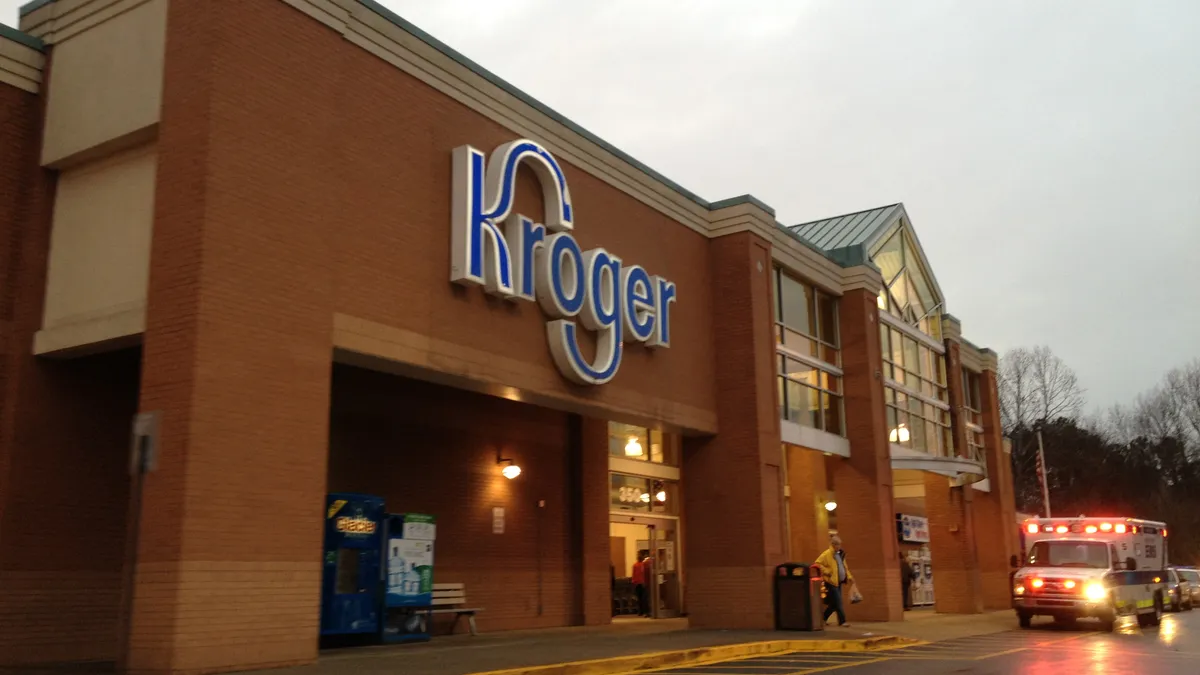Dive Brief:
- Kroger may be in talks with Ahold Delhaize regarding a merger between the two companies, according to the Cincinnati Business Courier. The speculation stems from an analyst’s report that Ahold may have hired advisors to help it explore a possible bid for Kroger.
- The combined companies generate $180 billion in annual sales, and would generate $1.8 billion in synergies through a merger, according to Bruno Monteyne, the London-based Bernstein analyst who wrote about the reported talks.
- The move would give greater scale, buying power and buying power to a struggling Kroger, which has seen its stock plummet 40% on the year, Monteyne noted. However, he believes a merger now between the two would be too soon, as Ahold Delhaize is still merging their operations following last year’s deal.
Dive Insight:
It’s hard to say whether these reports are accurate or not, as they’re based on layers of speculation that ultimately trace back to a Bloomberg report citing some Twitter chatter. Both Kroger and Ahold Delhaize have declined to comment on the matter.
But say the rumors are true — what would this massive merger accomplish for both companies? Increased scale and buying power would be the most apparent benefit. Kroger, which has labored to cut shelf prices and internal costs, could see increased efficiencies through the merger. According to Monteyne, the combined retailers’ size and efficiency would rival that of Walmart, though a Kroger-Ahold partnership would be “much stronger in ‘food experience’ and online,” he writes.
Monteyne estimated that the merger would produce $1.8 billion in synergies. Ahold-Delhaize certainly knows a thing or two about the benefits of combining supply chains and other resources, with an estimated $879 million in synergies coming over the next three years as the result of its own mega-merger last year.
“Ahold-Kroger … would be the leading player in this unconsolidated market and would have fantastic firepower to compete as the No. 1 player in the U.S. food and grocery market,” Monteyne noted.
In terms of coverage, the two grocers compete along the very crowded East Coast, but not in the Northeast, where Ahold-Delhaize has a large footprint through its Stop & Shop and Hannaford stores. Sorting out stores in markets where Kroger and its Harris Teeter banner goes head to head with Food Lion stores, for instance, could be a headache. Monteyne estimates that the companies would have to divest 258 stores in order to satisfy antitrust regulators.
Another major asset for Kroger is Peapod, Ahold-Delhaize’s pure-play e-commerce service, which would give it a home delivery option to complement its ClickList program. Peapod executives recently told Food Dive their annual growth is in the double digits. Kantar Retail Americas Market Insights estimates Peapod, which posted sales of $758 million in 2016, could see revenue top $1.2 billion by 2022.
Ultimately, the deal’s scale would help both companies confront the competitive challenges posed by Walmart, discounters Aldi and Lidl as well as Amazon-Whole Foods. Kroger, in particular, has struggled with pricing pressure, labor costs and the looming Amazon threat, and could use the added sales power and efficiencies.








